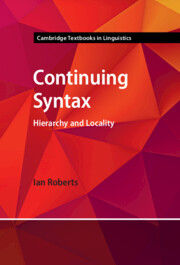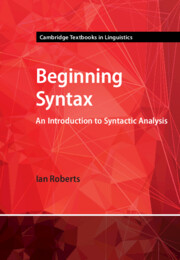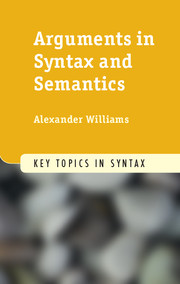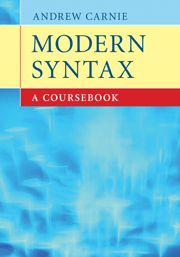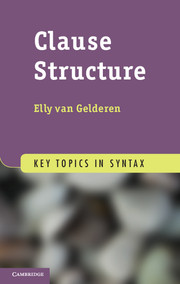Continuing Syntax
A logical and clear exposition of hierarchy and locality by a leading figure in the field, Continuing Syntax takes students from an introductory level of syntactic theory to an understanding of cutting-edge research in the field. A comprehensive range of topics is covered, including configurationality, head-movement, clause structure, nominal structure, subjacency, barriers and phases, ensuring that students have a thorough understanding of all the main components of contemporary theory. The many example sentences, extensive glossary, end-of-chapter exercises and annotated further reading lists allow readers to embed and extend their knowledge as they progress through the book. A self-contained work ideal for intermediate-level students, this volume also builds on the author's Beginning Syntax, and lays the foundation for a third volume, Comparing Syntax, which introduces formal syntactic typology.
- Makes formal theory accessible and interesting for students with a range of abilities and academic backgrounds
- Provides a clear rationale for syntactic notation, allowing students easily to make the link between terminology and theory
- The second in a three volume series covering all of the essential elements of syntax
- End-of-chapter exercises, full glossary, and annotated further reading lists
Reviews & endorsements
‘In this elegantly written book, Ian Roberts shows students how universal hierarchical syntactic structure can be motivated and explores how the properties of that structure constrain the ways that syntactic relations work. With clarity, originality and precision, the book takes students to an advanced understanding of contemporary Minimalist syntax.’ David Adger, Queen Mary University of London
‘This book is a comprehensive excursion into the current theory of generative syntax, taking students from the most basic aspects of syntactic analysis to the contemporary edges of syntactic theory. With its numerous exercises and comprehensive lists of references, it promises to prepare students to be conversant with the current syntactic literature, and to begin engaging in their own research.’ Nicholas Sobin, University of Texas, El Paso
‘Continuing Syntax is a superb second course in syntactic theory. Following Beginning Syntax, it presents the arguments and data that both challenge and develop previously achieved understandings. The text is written in an accessible manner, with step-by-step analysis in every chapter. End-of-chapter exercises and lists of further readings provide important material for classroom discussion and for student research endeavours.’ Olga Griswold, Cal Poly Pomona
‘This impressive work explains with exceptional clarity a broad range of syntactic phenomena, never losing sight of the big picture while elucidating complex interactions between theory and data. It can be profitably read both by those who want to know what the syntactic theory is about and by those engaged in high-level syntactic research, which in itself is a remarkable achievement.’ Zeljko Boskovic, University of Connecticut
‘There are several good introductions to syntax; however, a comprehensive, clear and reader-friendly advanced textbook that lays out the state of the art in syntactic theory has so far been a desideratum. Ian Roberts succeeds brilliantly in acquainting the reader with virtually all concepts that figure prominently in current research on syntax, thereby documenting substantial recent progress in the field.’ Gereon Müller, Universität Leipzig, Europe
‘A long-awaited textbook taking students to a higher level of syntax, connecting some traditional models with more current updates to the theory. Clear explanation of the technicalities makes it a very accessible read, and the generous dose of the trees helps students grasp the structural nuances. A great service to the field!’ Marcin Dadan, University of Florida
Product details
July 2025Hardback
9781009291668
450 pages
244 × 170 mm
Not yet published - available from July 2025
Table of Contents
- Preface
- 1. Goals and basic assumptions
- 2. Hierarchy I: phrase structure and grammatical functions
- 3. Hierarchy II: c-command, head-movement and locality
- 4. Hierarchy & categories I: refining the structure of the clause and the VP
- 5. Hierarchy & categories II: the structure of nominals
- 6. Case and the nature of infinitives
- 7. Features, case and agreement
- 8. Hierarchy and linear order
- 9. The origins of hierarchy: bare phrase structure
- 10. Wh-movement: unbounded dependencies, islands, subjacency and barriers
- 11. Covert movement, copy theory and reconstruction
- 12. Phases and phase impenetrability
- 13. Types of locality: phases and relativised minimality
- 14. The syntax of silence I: ellipsis
- 15. The syntax of silence II: empty pronouns
- 16. Wrapping up: parameters, features and futures.

